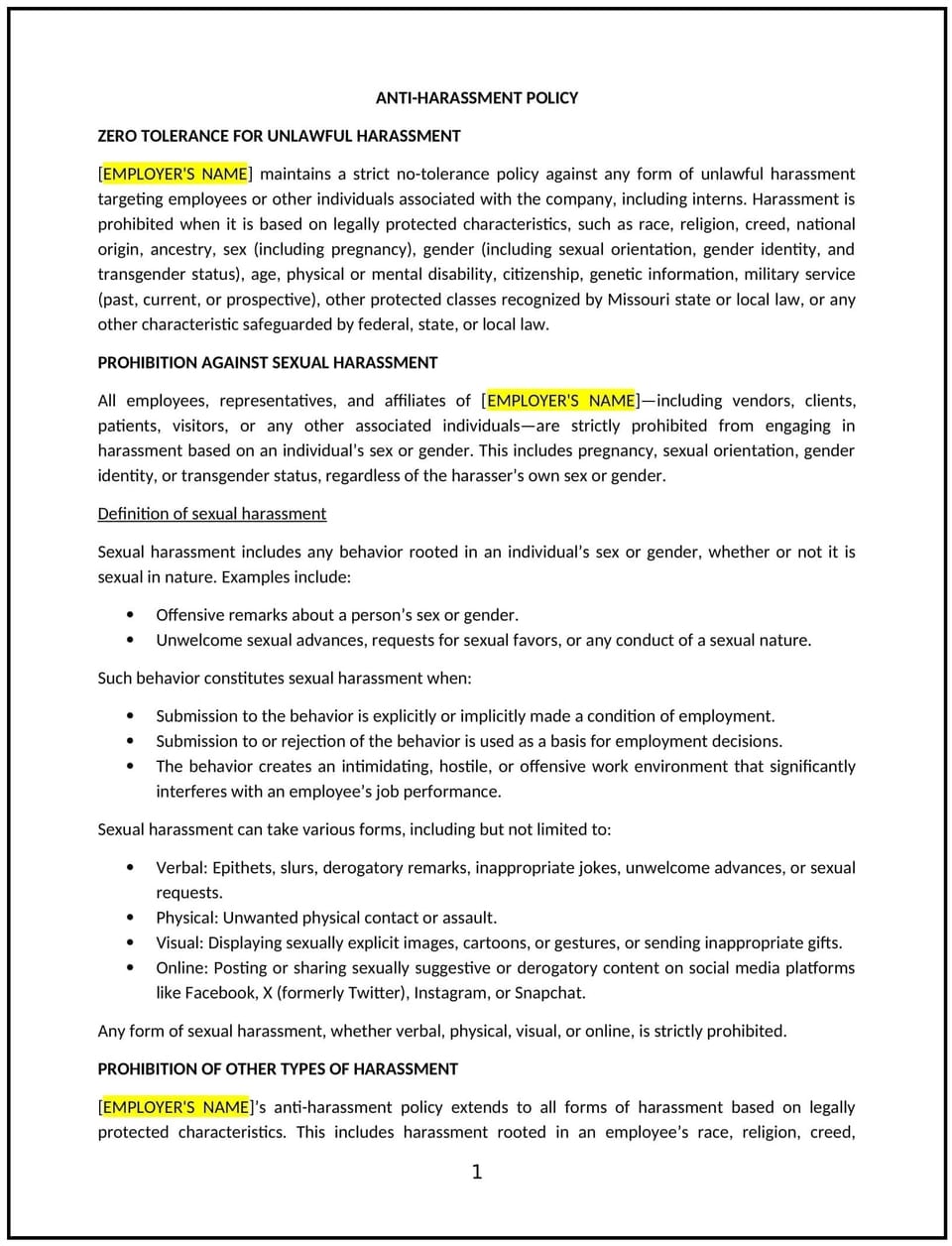Anti-harassment policy (Missouri): Free template

Anti-harassment policy (Missouri)
An anti-harassment policy helps Missouri businesses create a respectful and inclusive work environment by addressing and preventing harassment. This policy outlines the process for identifying, reporting, and addressing harassment in the workplace, whether it’s based on race, gender, age, sexual orientation, or other protected characteristics, in line with Missouri’s commitment to promoting fair treatment for all employees.
By adopting this policy, businesses in Missouri can protect employees from harassment, enhance workplace morale, and demonstrate their commitment to a safe and respectful work environment.
How to use this anti-harassment policy (Missouri)
- Define harassment: Clearly define what constitutes harassment, including physical, verbal, or visual conduct that creates an intimidating, hostile, or offensive work environment.
- Specify protected categories: Identify the categories of individuals protected from harassment, including race, gender, age, disability, and sexual orientation.
- Establish reporting procedures: Outline how employees should report harassment, including designated contacts, confidentiality measures, and the non-retaliation policy.
- Provide investigation guidelines: Detail the process for investigating harassment complaints, including timelines, procedures, and accountability measures.
- Establish corrective actions: Define the possible consequences of harassment, including disciplinary actions, corrective measures, and steps to prevent retaliation.
- Promote training and awareness: Provide training on identifying and preventing harassment for all employees, especially managers and supervisors.
- Create a supportive environment: Ensure employees feel safe and supported when reporting harassment and that their concerns will be taken seriously.
- Review and update the policy: Regularly assess the policy’s effectiveness and update it as needed to reflect changes in Missouri law or workplace dynamics.
Benefits of using this anti-harassment policy (Missouri)
Missouri businesses can benefit from this policy in several ways:
- Promotes a respectful workplace: Establishes guidelines for behavior that foster an inclusive and respectful environment.
- Reduces legal risks: Helps protect the business from legal action by addressing and preventing harassment early.
- Supports employee well-being: Provides a safe environment where employees feel respected and valued.
- Encourages open communication: Promotes a culture where employees can raise concerns without fear of retaliation.
- Enhances business reputation: Demonstrates the business’s commitment to fair treatment and ethical conduct, improving its image and employee loyalty.
- Aligns with state and federal laws: Reflects Missouri’s commitment to upholding employee rights and ensuring a safe working environment.
Tips for using this anti-harassment policy (Missouri)
- Ensure all employees are familiar with the policy and the reporting process through training and regular communication.
- Establish clear and accessible reporting mechanisms to encourage employees to speak up without fear of retaliation.
- Investigate all harassment complaints promptly and take appropriate corrective action.
- Create a safe environment where employees feel comfortable raising concerns about harassment.
- Regularly review and update the policy to align with any changes in Missouri law or company practices.
Q: Why should Missouri businesses adopt an anti-harassment policy?
A: Businesses should adopt this policy to promote a respectful workplace, prevent harassment, and protect employees from inappropriate behavior.
Q: What constitutes harassment in the workplace?
A: Harassment includes any unwelcome behavior that creates a hostile, intimidating, or offensive work environment, based on factors such as race, gender, or sexual orientation.
Q: How should businesses handle harassment complaints?
A: Businesses should create clear reporting procedures, investigate complaints promptly, and take appropriate corrective actions while ensuring non-retaliation.
Q: How can businesses prevent harassment in the workplace?
A: Businesses should provide training on acceptable behavior, foster a culture of respect, and establish clear reporting channels for employees to raise concerns.
Q: How often should businesses review the anti-harassment policy?
A: Businesses should review the policy annually or whenever there are significant changes to the workplace or relevant laws.
This article contains general legal information and does not contain legal advice. Cobrief is not a law firm or a substitute for an attorney or law firm. The law is complex and changes often. For legal advice, please ask a lawyer.


